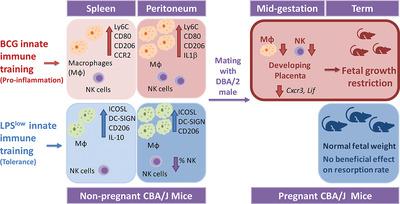当前位置:
X-MOL 学术
›
J. Leukoc. Biol.
›
论文详情
Our official English website, www.x-mol.net, welcomes your
feedback! (Note: you will need to create a separate account there.)
BCG-trained innate immunity leads to fetal growth restriction by altering immune cell profile in the mouse developing placenta
Journal of Leukocyte Biology ( IF 3.6 ) Pub Date : 2021-09-17 , DOI: 10.1002/jlb.4a0720-458rr Yipu Dang 1 , Camille Souchet 1 , Fabiana Moresi 1 , Mohamed Jeljeli 1, 2 , Bruno Raquillet 1 , Carole Nicco 1 , Sandrine Chouzenoux 1 , Isabelle Lagoutte 1 , Louis Marcellin 1, 3 , Frederic Batteux 1, 2 , Ludivine Doridot 1
Journal of Leukocyte Biology ( IF 3.6 ) Pub Date : 2021-09-17 , DOI: 10.1002/jlb.4a0720-458rr Yipu Dang 1 , Camille Souchet 1 , Fabiana Moresi 1 , Mohamed Jeljeli 1, 2 , Bruno Raquillet 1 , Carole Nicco 1 , Sandrine Chouzenoux 1 , Isabelle Lagoutte 1 , Louis Marcellin 1, 3 , Frederic Batteux 1, 2 , Ludivine Doridot 1
Affiliation

|
Trained immunity is a new concept illustrating that innate immune cells are able to undergo a long-term metabolic and epigenetic reprogramming after infection or vaccination, thus displaying either a pro- or an anti-inflammatory phenotype during a sequential unrelated challenge. Innate immune cells such as natural killer (NK) cells and macrophages constitute a large part of the decidual leukocyte population at the maternal–fetal interface, playing an important role in placental development and as such in fetal growth and development. In this study, we hypothesized that training the innate immune cells before pregnancy could have an impact on pregnancy. To test this hypothesis, we used CBA/J x DBA/2 mouse model to investigate pregnancy outcomes and leukocyte population at the maternal–fetal interface. Although we were not able to show a beneficial effect of LPS-tolerogenic training on fetal resorption, Bacillus Calmette–Guérin (BCG) training, known to prime innate immune cells to be proinflammatory, led to fetal growth restriction, without aggravating the fetal resorption rate. We also found that BCG training led to less NK cells and macrophages at the maternal–fetal interface at the early stage of placentation (E9.5), associated with a down-regulation of Ccr3 and Lif mRNA expression. This induced altered leucocyte population profile can be an explanation for the subsequent fetal growth restriction. These data suggest that preconceptional infections-induced trained immunity could influence pregnancy outcomes.
中文翻译:

BCG 训练的先天免疫通过改变小鼠胎盘发育中的免疫细胞谱导致胎儿生长受限
训练有素的免疫是一个新概念,说明先天免疫细胞能够在感染或接种疫苗后进行长期的代谢和表观遗传重编程,从而在连续无关的挑战中表现出促炎或抗炎表型。自然杀伤 (NK) 细胞和巨噬细胞等先天免疫细胞构成母胎界面蜕膜白细胞群的很大一部分,在胎盘发育以及胎儿生长发育中发挥重要作用。在这项研究中,我们假设在怀孕前训练先天免疫细胞可能会对怀孕产生影响。为了检验这一假设,我们使用 CBA/J x DBA/2 小鼠模型来研究妊娠结局和母胎界面的白细胞数量。虽然我们无法证明 LPS 耐受性训练对胎儿再吸收的有益影响,但已知卡介苗 (BCG) 训练,已知会引发先天免疫细胞促炎,导致胎儿生长受限,而不会加剧胎儿再吸收率. 我们还发现,BCG 训练导致胎盘早期(E9.5)母胎界面处的 NK 细胞和巨噬细胞减少,这与 Ccr3 和 Lif mRNA 表达的下调有关。这种诱导的白细胞群分布改变可以解释随后的胎儿生长受限。这些数据表明,孕前感染诱导的训练有素的免疫力可能会影响妊娠结局。已知先天免疫细胞促炎,导致胎儿生长受限,而不会增加胎儿的吸收率。我们还发现,BCG 训练导致胎盘早期(E9.5)母胎界面处的 NK 细胞和巨噬细胞减少,这与 Ccr3 和 Lif mRNA 表达的下调有关。这种诱导的白细胞群分布改变可以解释随后的胎儿生长受限。这些数据表明,孕前感染诱导的训练有素的免疫力可能会影响妊娠结局。已知先天免疫细胞促炎,导致胎儿生长受限,而不会增加胎儿的吸收率。我们还发现,BCG 训练导致胎盘早期(E9.5)母胎界面处的 NK 细胞和巨噬细胞减少,这与 Ccr3 和 Lif mRNA 表达的下调有关。这种诱导的白细胞群分布改变可以解释随后的胎儿生长受限。这些数据表明,孕前感染诱导的训练有素的免疫力可能会影响妊娠结局。与 Ccr3 和 Lif mRNA 表达的下调有关。这种诱导的白细胞群分布改变可以解释随后的胎儿生长受限。这些数据表明,孕前感染诱导的训练有素的免疫力可能会影响妊娠结局。与 Ccr3 和 Lif mRNA 表达的下调有关。这种诱导的白细胞群分布改变可以解释随后的胎儿生长受限。这些数据表明,孕前感染诱导的训练有素的免疫力可能会影响妊娠结局。
更新日期:2021-09-17
中文翻译:

BCG 训练的先天免疫通过改变小鼠胎盘发育中的免疫细胞谱导致胎儿生长受限
训练有素的免疫是一个新概念,说明先天免疫细胞能够在感染或接种疫苗后进行长期的代谢和表观遗传重编程,从而在连续无关的挑战中表现出促炎或抗炎表型。自然杀伤 (NK) 细胞和巨噬细胞等先天免疫细胞构成母胎界面蜕膜白细胞群的很大一部分,在胎盘发育以及胎儿生长发育中发挥重要作用。在这项研究中,我们假设在怀孕前训练先天免疫细胞可能会对怀孕产生影响。为了检验这一假设,我们使用 CBA/J x DBA/2 小鼠模型来研究妊娠结局和母胎界面的白细胞数量。虽然我们无法证明 LPS 耐受性训练对胎儿再吸收的有益影响,但已知卡介苗 (BCG) 训练,已知会引发先天免疫细胞促炎,导致胎儿生长受限,而不会加剧胎儿再吸收率. 我们还发现,BCG 训练导致胎盘早期(E9.5)母胎界面处的 NK 细胞和巨噬细胞减少,这与 Ccr3 和 Lif mRNA 表达的下调有关。这种诱导的白细胞群分布改变可以解释随后的胎儿生长受限。这些数据表明,孕前感染诱导的训练有素的免疫力可能会影响妊娠结局。已知先天免疫细胞促炎,导致胎儿生长受限,而不会增加胎儿的吸收率。我们还发现,BCG 训练导致胎盘早期(E9.5)母胎界面处的 NK 细胞和巨噬细胞减少,这与 Ccr3 和 Lif mRNA 表达的下调有关。这种诱导的白细胞群分布改变可以解释随后的胎儿生长受限。这些数据表明,孕前感染诱导的训练有素的免疫力可能会影响妊娠结局。已知先天免疫细胞促炎,导致胎儿生长受限,而不会增加胎儿的吸收率。我们还发现,BCG 训练导致胎盘早期(E9.5)母胎界面处的 NK 细胞和巨噬细胞减少,这与 Ccr3 和 Lif mRNA 表达的下调有关。这种诱导的白细胞群分布改变可以解释随后的胎儿生长受限。这些数据表明,孕前感染诱导的训练有素的免疫力可能会影响妊娠结局。与 Ccr3 和 Lif mRNA 表达的下调有关。这种诱导的白细胞群分布改变可以解释随后的胎儿生长受限。这些数据表明,孕前感染诱导的训练有素的免疫力可能会影响妊娠结局。与 Ccr3 和 Lif mRNA 表达的下调有关。这种诱导的白细胞群分布改变可以解释随后的胎儿生长受限。这些数据表明,孕前感染诱导的训练有素的免疫力可能会影响妊娠结局。









































 京公网安备 11010802027423号
京公网安备 11010802027423号